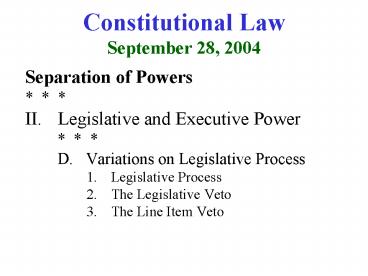Constitutional Law September 28, 2004 PowerPoint PPT Presentation
1 / 13
Title: Constitutional Law September 28, 2004
1
Constitutional LawSeptember 28, 2004
- Separation of Powers
- Legislative and Executive Power
- Variations on Legislative Process
- Legislative Process
- The Legislative Veto
- The Line Item Veto
2
Recap
- Presidential Control of Agencies
- Take Care Clause Unitary Executive
- Means of Control
- Battle for Control
- Appointment Power
- Art. II 2, cl. 2 Exclusive (Buckley)
- Principal/Inferior Distinction (Morrison)
- Removal (Inherent Power)
- Cases
- Relevant Factors
3
f. Decision Tree
Step 1 Removal Provision
Congressional Consent Invalid (except purely
legislative)
For Cause Removal (go on)
Step 2 Functions
QL or QJ Functions Valid (except very high level?)
Core Executive Functions (go on)
Step 3 Officer
Principal, Policymaking Officer Invalid
Inferior, Nonpolicy Officer Valid
4
More on Morrison
- Open removal power issues
- Principal vs. inferior executive officers
- High level QL or QJ officials
- Independent Counsel
- Courts assessment of power impact
- Nonrenewal of law
- Broader issues
- Essential functions test functionalism
- Divided government
5
D. Legislative Variations1. Legislative Process
- Basic Requirements (link)
- Bicameralism
- Presentment
- Functions
- Representation
- Deliberation
- Courts Rejection of Variations
- Legislative Veto
- Line Item Veto
6
2. Legislative Veto
- Operation
- One House Veto
- Two House Veto
- Popularity
- Increases Congressional Control (link)
- Widely Used
- Invalid after Chadha
- Extended to All Forms
- Severability Issue
7
d. Chadha
- Background and procedure
- Syllogism
- Legislation must follow Art. I
- Veto is legislation w/o Art. I
- Therefore it is unconstitutional
- Why is the veto legislation?
- Changes Chadhas legal status
- Undelegates authority
8
e. Chadha Discussion
- Great facts
- Formalism
- Distinguish AGs Decision (link)
- Does it Matter What the Veto Is?
- Legislative (Majority)
- Judicial (Powell)
- Executive?
9
3. Line Item Veto
- General
- Operation
- Purpose (logrolling and riders)
- Incorporation into State Constitutions
- Federal?
- Contract w/ America
- Line Item Veto Act
- Expansion of Presidential Power
10
c. Clinton v. New York
- Cancellation Pursuant to Standards
- Effect of Amendment by Repeal
- Violates Article I
- No Presidential Amendment/Repeal
- Not within Veto Power
- Discussion
- Is this repeal or execution?
- Could Congress rewrite the statute?
11
From fn. 16 . . . Executive action under
legislatively delegated authority that might
resemble "legislative" action in some respects is
not subject to the approval of both Houses of
Congress and the President for the reason that
the Constitution does not so require. That kind
of Executive action is always subject to check by
the terms of the legislation that authorized it
and if that authority is exceeded it is open to
judicial review as well as the power of Congress
to modify or revoke the authority entirely. A
one-House veto is clearly legislative in both
character and effect and is not so checked . . .
Back
12
Impact of Legislative Veto
President
3/5 of H/S
AG
Grant Asylum
Easy
Hard
Asylum Policy Preference
No Veto Chadha Stays
Veto Chadha Goes
Back
13
Art. I, 7, cl. 2
Every Bill which shall have passed the House of
Representatives and the Senate, shall, before it
become a Law, be presented to the President of
the United States If he approve he shall sign
it, but if not he shall return it, with his
Objections to that House in which it shall have
originated, who shall enter the Objections at
large on their Journal, and proceed to reconsider
it. If after such Reconsideration two thirds of
that House shall agree to pass the Bill, it shall
be sent, together with the Objections, to the
other House, by which it shall likewise be
reconsidered, and if approved by two thirds of
that House, it shall become a Law. . . . If any
Bill shall not be returned by the President
within ten Days (Sundays excepted) after it shall
have been presented to him, the Same shall be a
Law, in like Manner as if he had signed it,
unless the Congress by their Adjournment prevent
its Return, in which Case it shall not be a Law.
Back

